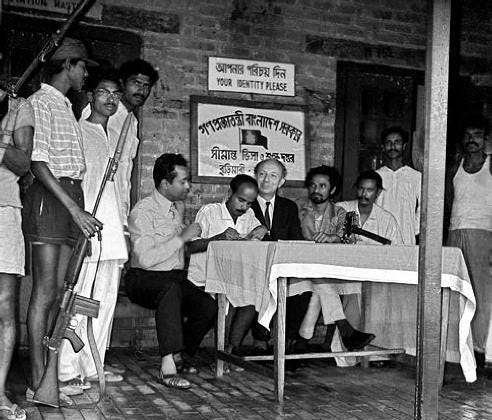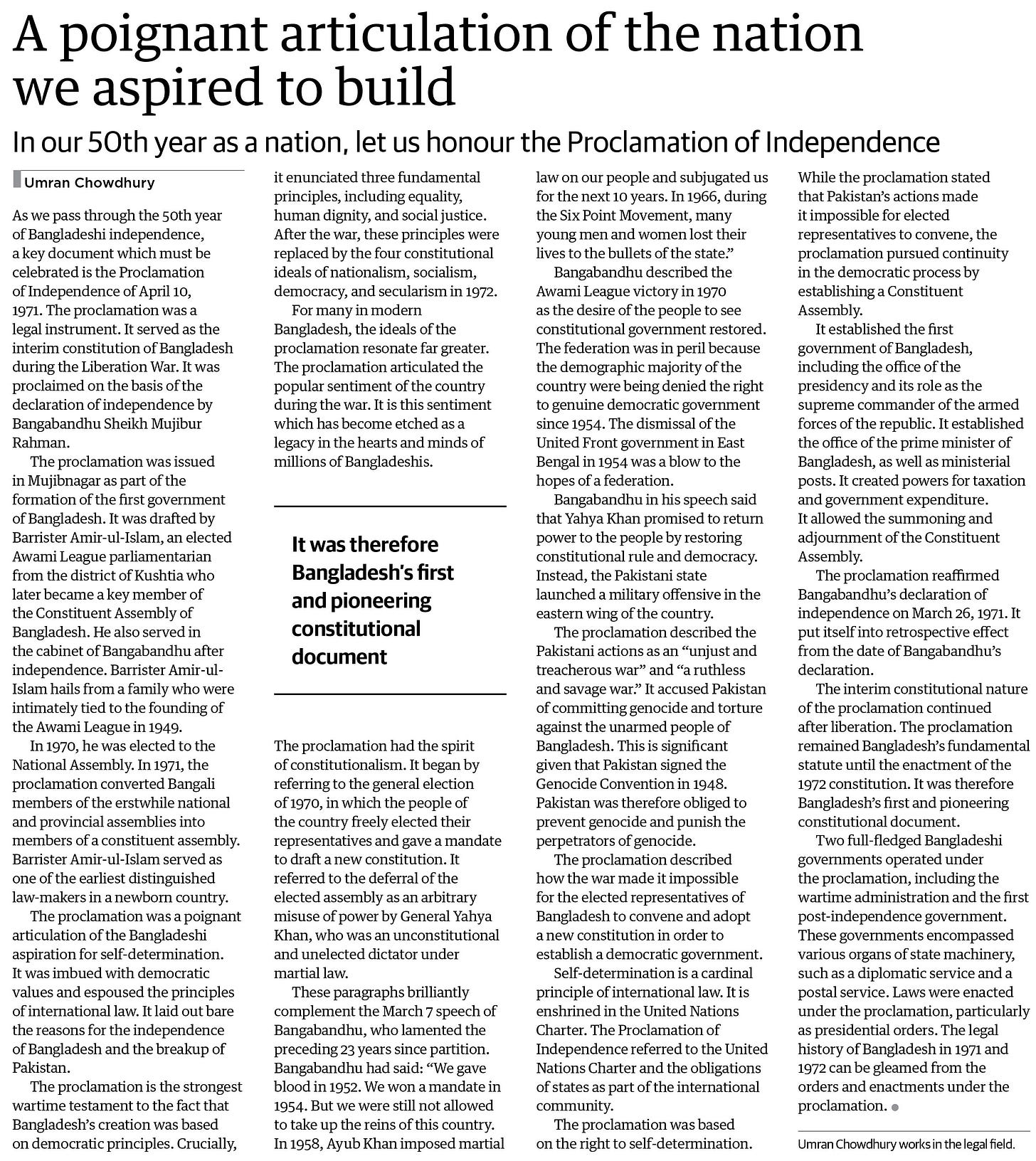A poignant articulation of the nation we aspired to build
For legal historians, the Proclamation of Independence will be an intriguing aspect of the Bangladesh Liberation War. In the words of its principal author Barrister Amir-ul-Islam, it was essentially the “birth certificate” of Bangladesh. The draft of the proclamation was reviewed by the Indian lawyer Subrata Roy Chowdhury, who found Amir-ul-Islam’s draft to be perfect and flawless, noting that not a single word, comma or semi-colon had to be changed and that the content of the proclamation was consistent with the recognized principles of international law. Inspired by the liberation of Bangladesh, Chowdhury later wrote the book ‘The genesis of Bangladesh’.
During the early days of the Liberation War following Pakistan’s crackdown on 26 March 1971, Amir-ul-Islam journeyed to Calcutta by foot. He accompanied Bangladesh’s first prime minister Tajuddin Ahmad on the journey across the border after the start of Operation Searchlight. They were taken to meet senior officials in the Indian government after crossing the border. Both men were flown to Delhi where Tajuddin met with Indian prime minister Indira Gandhi.
I wrote an article in 2021 which was published in the Dhaka Tribune. It emphasized the historical significance of the proclamation. What always stood out to me were the key principles enunciated by the proclamation: equality, human dignity and social justice. Bangladesh later adopted four fundamental principles in its 1972 constitution, including nationalism, democracy, socialism and secularism. Given that the Proclamation of Independence can be treated as the “genesis of the Bangladesh Constitution”, its key principles can help us explain the spirit of the four fundamental principles to achieve a moderate interpretation of these principles.
A poignant articulation of the nation we aspired to build
Dhaka Tribune, 2021
As we pass through the fiftieth year of Bangladeshi independence, a key document which must be celebrated is the Proclamation of Independence of 10 April 1971. The proclamation was a legal instrument. It served as the interim constitution of Bangladesh during the Liberation War. It was proclaimed on the basis of the declaration of independence by Bangabandhu Sheikh Mujibur Rahman.
The proclamation was issued in Mujibnagar as part of the formation of the first government of Bangladesh. It was drafted by Barrister Amir-ul-Islam, an elected Awami League parliamentarian from the district of Kushtia who later became a key member of the Constituent Assembly of Bangladesh. He also served in the cabinet of Bangabandhu after independence. Barrister Amir-ul-Islam hails from a family who were intimately tied to the founding of the Awami League in 1949.
In 1970, he was elected to the National Assembly. In 1971, the proclamation converted Bengali members of the erstwhile national and provincial assemblies into members of a constituent assembly. Barrister Amir-ul-Islam served as one of the earliest distinguished lawmakers in a newborn country.
The proclamation was a poignant articulation of the Bangladeshi aspiration for self-determination. It was imbued with democratic values and espoused the principles of international law. It laid out bare the reasons for the independence of Bangladesh and the breakup of Pakistan.
The proclamation is the strongest wartime testament to the fact that Bangladesh’s creation was based on democratic principles. Crucially, it enunciated three fundamental principles, including equality, human dignity and social justice. After the war, these principles were replaced by the four constitutional ideals of nationalism, socialism, democracy and secularism in 1972.
For many in modern Bangladesh, the ideals of the proclamation resonate far greater. The proclamation articulated the popular sentiment of the country during the war. It is this sentiment which has become etched as a legacy in the hearts and minds of millions of Bangladeshis.
The proclamation had the spirit of constitutionalism. It began by referring to the general election of 1970 in which the people of the country freely elected their representatives and gave a mandate to draft a new constitution. It referred to the deferral of the elected assembly as an arbitrary misuse of power by General Yahya Khan, who was an unconstitutional and unelected dictator under martial law.
These paragraphs brilliantly complement the 7 March Speech of Bangabandhu who lamented the preceding 23 years since partition. Bangabandhu had said “We gave blood in 1952. We won a mandate in 1954. But we were still not allowed to take up the reigns of this country. In 1958, Ayub Khan imposed martial law on our people and subjugated us for the next ten years. In 1966, during the Six Point Movement, many young men and women lost their lives to the bullets of the state”.
Bangabandhu described the Awami League victory in 1970 as the desire of the people to see constitutional government restored. The federation was in peril because the demographic majority of the country were being denied the right to genuine democratic government since 1954. The dismissal of the United Front government in East Bengal in 1954 was a blow to the hopes of a federation.
Bangabandhu in his speech said that Yahya Khan promised to return power to the people by restoring constitutional rule and democracy. Instead, the Pakistani state launched a military offensive in the eastern wing of the country.
The proclamation described the Pakistani actions as an “unjust and treacherous war” and “a ruthless and savage war”. It accused Pakistan of committing genocide and torture against the unarmed people of Bangladesh. This is significant given that Pakistan signed the Genocide Convention in 1948. Pakistan was therefore obliged to prevent genocide and punish the perpetrators of genocide.
The proclamation described how the war made it impossible for the elected representatives of Bangladesh to convene and adopt a new constitution in order to establish a democratic government.
Self-determination is a cardinal principle of international law. It is enshrined in the United Nations Charter. The Proclamation of Independence referred to the United Nations Charter and the obligations of states as part of the international community.
The proclamation was based on the right to self-determination. While the proclamation stated that Pakistan’s actions made it impossible for elected representatives to convene, the proclamation pursued continuity in the democratic process by establishing a Constituent Assembly.
It established the first government of Bangladesh, including the office of the presidency and its role as the supreme commander of the armed forces of the republic. It established the office of the Prime Minister of Bangladesh, as well as ministerial posts. It created powers for taxation and government expenditure. It allowed the summoning and adjournment of the Constituent Assembly.
The proclamation reaffirmed Bangabandhu’s declaration of independence on 26 March 1971. It put itself into retrospective effect from the date of Bangabandhu’s declaration.
The interim constitutional nature of the proclamation continued after liberation. The proclamation remained Bangladesh’s fundamental statute until the enactment of the 1972 constitution. It was therefore Bangladesh’s first and pioneering constitutional document.
Two full-fledged Bangladeshi governments operated under the proclamation, including the wartime administration and the first post-independence government. These governments encompassed various organs of state machinery, such as a diplomatic service and a postal service. Laws were enacted under the proclamation, particularly as Presidential Orders. The legal history of Bangladesh in 1971 and 1972 can be gleamed from the orders and enactments under the proclamation.



